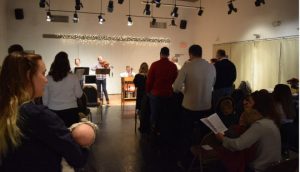I have been remiss. The calendar says Thanksgiving is coming. I was too focused on what food to cook for only five in my house that I forgot to think about the Pilgrim story. The calendar says that today I should be concluding my study of the Talmud tractate Eruvin (boundaries defining Sabbath space) to then begin tractate Pesachim (Passovers). I fell off the daily Talmud study wagon months ago, and I am humbled to say that I have some 90 folio pages (front & back) to catch up on. In experiencing the calendar, I found a deeper reason to be diligent again, especially about the stories we tell at dinner.

COVID-19 has changed so very much. One small byproduct of the pandemic changed my world for the better. My first-grade son’s class shifted from in-person school to at-home, online schooling when a classmate and a teacher-tested positive. Thankfully, they are fine and did not spread the virus to others in the school. Traditionally, the first grade puts on a Thanksgiving play in the auditorium the Tuesday before Thanksgiving; it is a big deal in the school. To this day, my whole family can still sing portions of the song my now ninth-grade daughter sang about the voyage of the Mayflower. Without the ability to practice on stage, though, the school opted to record a live-reading over Google Meet. This year’s play has something to do with a family of turkeys not wanting to be dinner and still wanting to be a part of the holiday. I cannot wait to see the finished product.
What changed my world was being in earshot of the virtual classroom. I heard not only this cute story of turkeys and townspeople; I also heard how the teacher taught the history of Thanksgiving. Contrary to all I thought I knew before reading Bill Newcott’s piece in National Geographic "400 Years On, The Pilgrims Get a Reality Check," the first Thanksgiving was as political as it was social. The Pilgrims and the Wappanoag Native Americans made a treaty of mutual defense. The students learned about Samoset and Squanto, who helped negotiate the treaty. They learned about doing no harm and not stealing. Yes, they also learned that the Wappanoag taught the Pilgrims farming techniques that yielded the harvest celebrated at Thanksgiving. What changed for me is that they also learned the context for these two peoples to come together.
The shift in Talmud tractates has a similar shift in stories. The discussion of what makes a boundary: who belongs in which shared courtyard, what mistakes might break or bridge a connection between spaces, and more occupy Eruvin’s approach to what Shabbat is about. The detailed discussions make everything about the intention to be able to carry or commune with others on the Sabbath. Pesachim will have similar detailed attention to what constitutes chametz (leavened grain prohibited on Passover) and how to observe the preparations and conduct of the seder meal. Eruvin stands apart from the tractate of Shabbat, though. Pesachim tells the story of the details and of the larger message of freedom from slavery. Pesachim is a reminder to tell both kinds of stories. We need to know the what and the how; we also need to know why.
Thanksgiving is not just about giving thanks for what we have. It is not just about remembering the gratitude of a group of religious refugees who established self-governance and had native people teach them how to survive. Thanksgiving is also about how real people addressed real problems, with some mistrust, for mutual benefit. Plymouth was a Patuxet village that had been wiped out by a plague three years before the Pilgrims arrived. The Pilgrims lost many their first winter and, through that treaty, turned Plymouth into a symbolic rock upon which we tell our American stories. This Thanksgiving, nourish yourself on all those stories and stories of your own. We have so many stories to tell; and, at this year’s dinner table, nothing to do but listen.
About Rabbi Jeremy Winaker
Rabbi Jeremy Winaker is the executive director of the Greater Philadelphia Hillel Network, responsible for West Chester University, Haverford, Bryn Mawr, and other area colleges. He is the former head of school at the Albert Einstein Academy in Wilmington and was the senior Jewish educator at the Kristol Hillel Center at the University of Delaware for four years. Rabbi Winaker lives in Delaware with his wife and three children.


Comments